The main objective of the PRO-PLAT project, financed by the Marche region, is to produce sustainable high-quality Saturn peaches and nectarines by reducing the environmental impact of stone fruit production employing resilient cultivars that can be grown using sustainable management techniques; increasing product security and quality not only by cutting down chemical residues but also by indicating the best ways to consume a product and selecting cultivars with high health and nutritional qualities so as to promote the fruit with consumers.
The project will last 3 years and involves an investment of around €300,000. Azienda Agricola Eleuteri is in charge, in collaboration with the Faculties of Medicine and Agriculture of Università Politecnica delle Marche (UNIVPM), BiomedFood (spin-off of the University of Ancona) and the IRTA institute. The scientific coordinator is professor Davide Neri UNIVPM.
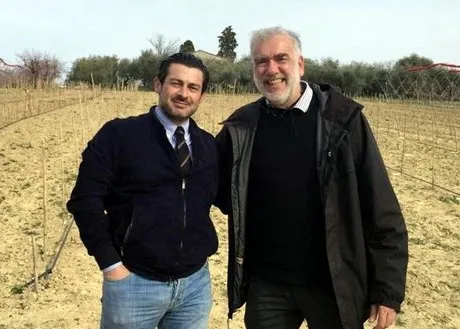 Marco Eleuteri and Prof. Davide Neri. Behind them, an experimental field.
Marco Eleuteri and Prof. Davide Neri. Behind them, an experimental field.
Marco Eleuteri, CEO of Op Armonia and owner of Az Agricola Eleuteri together with his sister, explains that "the project on peaches and nectarines adds to a previous project started three years ago and still ongoing - together with CREA Rome, we are looking for new Italian varieties (we have obtained thousands of crossbreeds and set up an experimental field with around one thousand plants) that can further improve the quality characteristics of Saturn peaches."
"In addition to sustainability, the objective is to describe and promote the nutritional and functional properties of the varieties introduced."
"The results of this experiment will be at the basis of our company's future. Over the next three years, we are aiming to reach around 150 hectares in Marche (we currently have 70). Combined with that of other two companies part of Op Armonia, our expansion should take the group to at least 200 hectares by the end of 2022."
New varieties that extend the production window will be introduced as well as others that are particularly resilient.
In the photo above: Saturn peaches in greenhouses. They are expected to ripen around 15th/20th May.
The new varieties will be tested at Eleuteri as well as the IRTA research institute in Spain to determine which are more interesting and most suitable to be grown in Marche.
The Moscatelli company will set up demonstration fields where the technical-agronomic innovations will be implemented as well as low-impact or organic cultivation techniques.
Photoselective nets capable of anticipating ripening times will be implemented as well as an anti-drip and anti-hail system to contain physiopathologies and pathologies and as a mechanical screen against the brown marmorated stink bug. Mulching films will reduce the need for chemical and mechanical weeding.
The ultimate purpose is to strengthen the presence on the market and the consumption of these peaches, not only by stressing that they are produced employing techniques with a reduced environmental impact, but also providing consumers with information on the best time to consume them.
Biomedfood and the two UNIVPM departments involved will monitor the evolution of quality parameters during the post-harvesting stage, supplying consumers with information on the ideal moment to consume the product thanks to something like "RipeSense®" on the label.
The project is expected to support the excellent Marche peach production while extending the market window.
Marco Eleuteri welcomed the first visit of IRTA researchers. "They were astonished, especially when we told them that peach plants need to face south just like for the Barolo specification."
Above, left to right: Umberto Santoni (Eleuteri agronomist), founder Giorgio Eleuteri, Gemma Reig (Peach Tree Crop Specialist IRTA), Miquel Peris Giner (Technology Transfer and Extension Fruit Production IRTA), Marco Eleuteri and Prof. Davide Neri. Below: Marco Eleuteri talks to IRTA researchers about the unique characteristics of the cultivation environment.
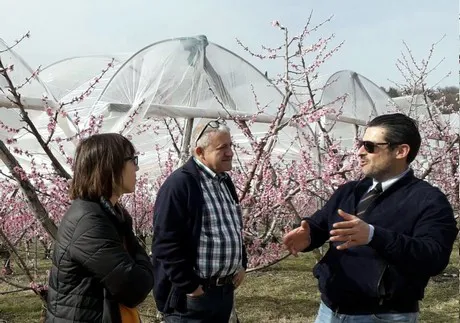
"Prof. Neri explains that the gentle evening sea breeze that usually swipes the area maintains it dry preventing humidity stagnation. It is a unique characteristic of these Marche valleys and it is one of the factors that make the area ideal to grow Saturn peaches and nectarines."
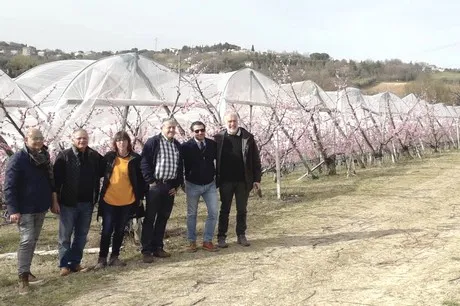
"The idea was to produce the nicest peaches in the world. That is why we started off the first project in 2015 with Davide Neri who, at the time, was the director of CREA Rome. Now we are studying around one thousand plantlets: an excellent example of public-private work conducted by Marcello Cutuli."
In the meantime, crossbreeds are still carried out. "I do not know what we will achieve in the end, but it will be the fruit of passion, skill, professionalism and knowledge. My father Giorgio chooses which plants we ought to use for the pollen from the 80 thousand we have. He chooses the best ones. We are hopeful that we can find something interesting."
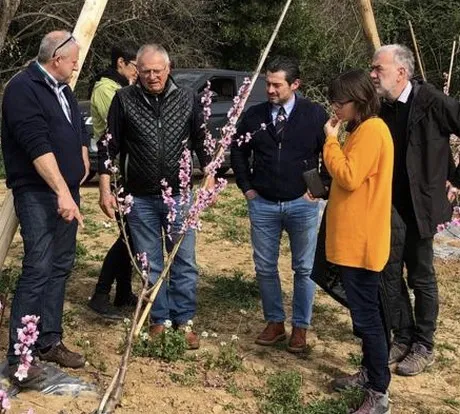 Giorgio Eleuteri is the second from left.
Giorgio Eleuteri is the second from left.
"This is the type of agriculture we like, one that thinks, decides and acts. This project, 80% of which was financed through Marche's Regional Development Plan, shows how the private and public sectors can work together and also involve foreign bodies such as the IRTA, probably the most important research institute in the world when it comes to Saturn peaches."
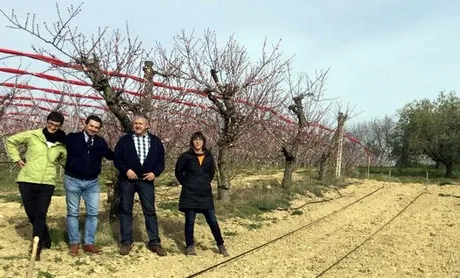 A photo that is the emblem of over thirty years of history. Behind Marco and his partners, you can see the mother plants of the Stark Saturn variety planted 34 years ago. Right in front of them you can see the new plants part of the experimental orchard.
A photo that is the emblem of over thirty years of history. Behind Marco and his partners, you can see the mother plants of the Stark Saturn variety planted 34 years ago. Right in front of them you can see the new plants part of the experimental orchard.
"I would like to define us as a sort of Dream Peach Team that will observe and study the behavior of around 40 different flat peach and nectarine varieties so as to assess their adaptability to the production environments. I would say this is an ambitious project, unique in the world, that should enable us to further improve the quality of our productions, which is already among the highest in Europe. The results will be at the base of the extension of cultivated surfaces over the next few years, enabling Op Armonia to hold a greater position on the European market currently dominated by our Spanish cousins."
Contacts: info@pescasaturnia.it / info@aoparmonia.it
